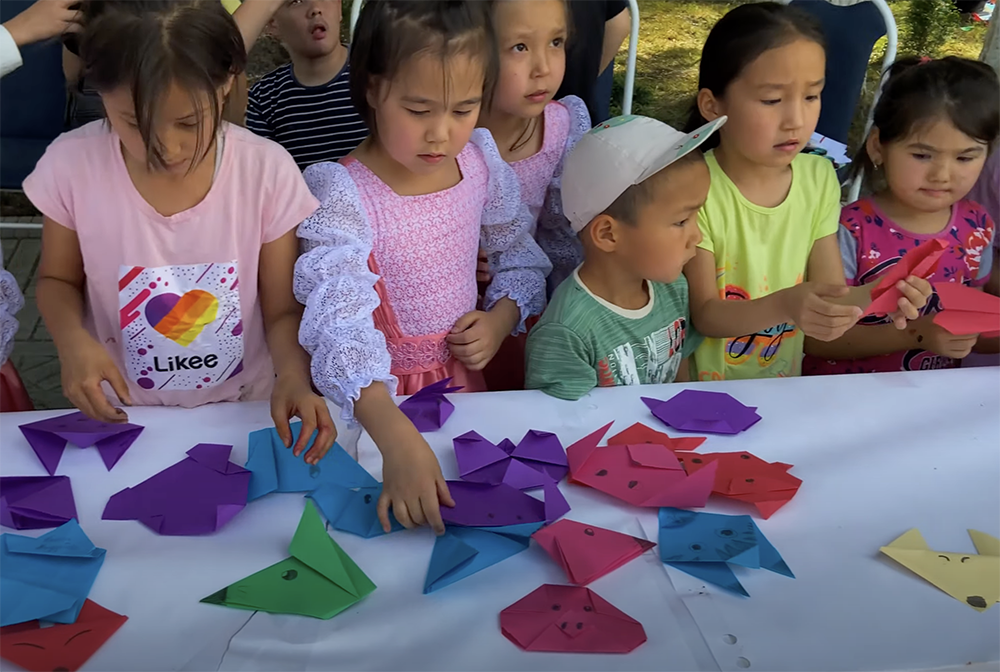CLEA Carves a Path to Civic Engagement at a Pioneering Early College in Kyrgyzstan
CLEA programs provide seminars, mentorships, and pedagogies in support of socially engaged project work while increasing access to higher education for early college students. The program at TSI also offers a wide array of career-focused majors, including software engineering, entrepreneurship, finance, design management, banking, and ecology/sustainability. 75 faculty members serve 450 students and more than 100 students are expected to graduate from the program in 2023.
Convincing Faculty and Creating a Curriculum
The program got its start when TSI leaders, impressed by OSUN’s Network Collaborative Course on Civic Engagement, taught by Jonathan Becker and Erin Cannan, decided it was important to help their faculty actively integrate civic engagement, liberal arts, and critical thinking into their teaching.
Their first objective was to convince teachers that including civic engagement in the curriculum was a good idea. Initially, some departments hesitated but training sessions and workshops focused on issues such as developing STEM proposals and appropriate syllabi induced faculty to gradually change their minds.
Faculty attended development seminars where they learned about responsible citizenship, community-based learning, critical pedagogy, and discipline-specific implementation of civic engagement work. They also received guidance on course design and ways to deal with obstacles to implementation. The civic engagement-focused training became so popular that TSI administration decided to mandate that teachers receive it as part of their regular orientation.

TSI student Marlen Kalilov works with the Legacy team developing an electronic queue management system.
Enthusiastic faculty eventually began sharing their experiences with colleagues at other public schools and state colleges who in turn decided to include it in their pedagogies. Faculty grants were awarded so civic participation could be added to curricula in 14 public schools. New techniques that supported interactive teaching methods and critical thinking were initiated and students at TSI and beyond were soon developing their own projects aimed at resolving local social issues.
Kazakbaeva Kanykel, an instructor in economics and business ethics, says positive results from a civic engagement initiative at her school helped persuade the principal to actively support full implementation. “She became interested in civic engagement and then spread the idea throughout the whole school; volunteer squads were organized to assist retired people. Now civic engagement will be introduced into each subject at the school and all teachers will be trained in it,” she says.
“I’m Doing it Because I Want to Help”
With faculty on board, students in the civic engagement program now learn about setting goals, managing projects, communicating effectively, and analyzing project results. An important part of the program is its Final Interdisciplinary Project (FIP), a long-term research and social / business venture that provides a social and commercial service. Student projects do not have to be profitable but they must have a social component and must be self-sustaining.
For his FIP, student Marlen Kalilov developed an electronic queue management system called Legacy. “Our project helps banks solve optimization problems and serve ordinary people,” he says in a video about the program. “Legacy also helps solve social problems by helping banks to serve people with disabilities, pregnant women, and single mothers.”
Student Altynai Nurbek kyzy developed Kind Script, a clothing business venture that assists children with disabilities by using a special font based on the writing of children with cerebral palsy. Children from the Alamudun District in Kyrgyzstan participated in the creation of a font that was then printed on hoodies and t-shirts. Fifty percent of the income from the imprinted clothing now goes to a public organization funding care for children with similar disabilities.

The KindScript team organized inclusive games and workshops where children with or without cerebral palsy could build their social skills.
In addition, the Kind Script team uses ecologically sound packaging and sources its materials from local producers, rather than ordering from abroad. They also work to improve socialization by organizing inclusive events, where children with or without cerebral palsy participate together in games, competitions, and workshops.
Saniet Dzhekshenkulova, who studied ecology and energy efficiency at TSI and was honored as TSI Civic Engagement Leader of 2022, says ”We've all noticed how we've grown from ‘I'm doing it for college’ students to ‘I'm doing it because I want to help.’ Through their projects, “We were able to help women living in crisis centers, children with cancer, low-income families, orphanages, rehabilitation centers, nursing homes, and homeless dogs,” she adds.
Aigerim Bokoeva, Dean of the School of Entrepreneurship and Service to Society, points out that TSI’s key innovation lies in the way it integrates civic engagement with education to benefit both students and communities.
“TSI is the first academic establishment in Kyrgyzstan to realistically apply student theses to social entrepreneurship initiatives, working alongside large companies and involving the public in resolving social concerns,” says Bokoeva. “By providing an understanding of the instruments and strategies of civic development, our teachers and students help communities attain self-determination through furthering the importance of civic involvement.”
Learn more about TSI here
Post Date: 03-21-2023